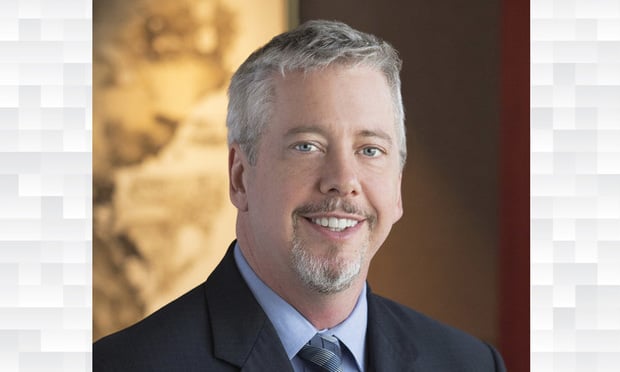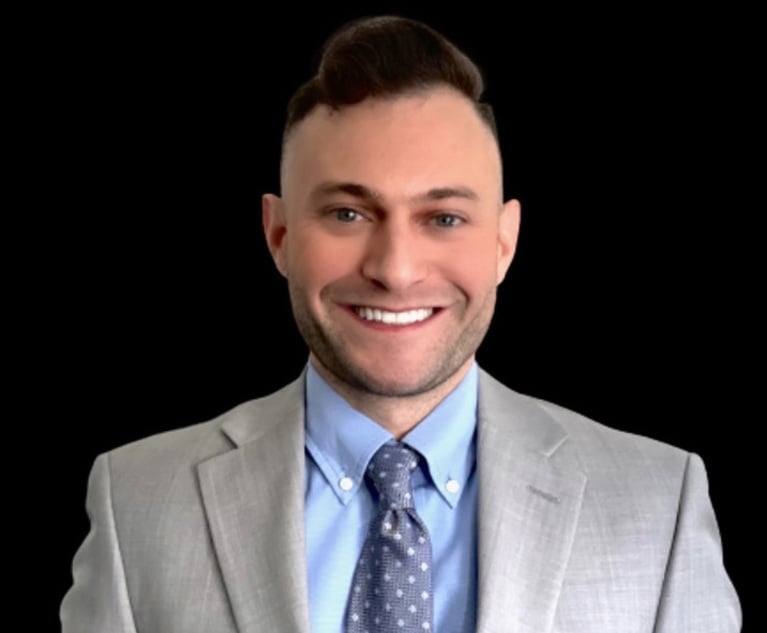LA Judge Reinstates $131 Million Patent Award, Doubles It for Willfulness
Morgan Lewis guides nonprofit to enhanced damages in hearing implant dispute as U.S. District Judge Fernando Olguin cites Supreme Court's new rules and defendant Cochlear's conduct before and after trial.
November 07, 2018 at 06:48 PM
5 minute read
 Michael Lyons, with Morgan, Lewis & Bockius.
Michael Lyons, with Morgan, Lewis & Bockius.
A few years ago, U.S. District Judge Fernando Olguin of the Central District of California seemed to be on Cochlear Ltd.'s side.
Although a jury awarded $131 million against the Australian hearing implant giant in 2014 for infringing four patent claims, Olguin ruled post-trial that three of the four claims were invalid. He also granted a new trial on damages and rejected the jury's finding that the award was willful.
Now, after a trip to the U.S. Court of Appeals for the Federal Circuit, a change in the law of willfulness from the Supreme Court, and a re-examination proceeding that seems to have irked the judge, Olguin has come down on Cochlear hard. He's not only reinstated the $131 million infringement award, he's doubled it for willfulness. The total comes to $268 million with supplemental damages.
Considering the jury verdict and the “high level of culpability of Cochlear's conduct” both before and after the verdict, “doubling the damages is sufficiently punitive for Cochlear's egregious conduct in this case,” Olguin wrote in a 72-page order issued Sunday.
The win goes to the Alfred E. Mann Foundation for Scientific Research and its licensee, Advanced Bionics. A Morgan, Lewis & Bockius team led by partner Michael Lyons represented both. “The Court provided a thorough and nuanced analysis explaining in detail its rationale for enhancing damages and concluding 'Cochlear's conduct was more flagrant than most,'” Lyons said in a written statement.
Morgan Lewis partners Thomas Peterson, Jason Gettleman and Michael Carr were among those also providing support.
Cochlear was represented by Sheppard, Mullin, Richter & Hampton. “We are surprised by the decision and do not agree with the reasons given by the judge,” Cochlear CEO Dig Howitt said in a written statement. “We will continue to defend this case and the next step in the litigation process is our appeal to the U.S. Court of Appeals. The case is likely to take years to finally resolve.”
The Australian company is the undisputed worldwide leader in hearing implants. But that leadership faced a challenge in the 1990s when the Mann Foundation patented an implant based on back telemetry technology and a method for testing it. Advanced Bionics incorporated the technology into its Clarion implant in 1996. “In the blink of an eye, the newly introduced Clarion took a significant 30 percent of Cochlear's market share,” Olguin wrote in his order.
Cochlear responded by updating its Nucleus implant with similar technology. It wasn't until 2003 that the Mann Foundation formally raised concerns with Cochlear about infringement. The foundation sued in 2006.
Following the jury verdict, Olguin ruled that both of the implant claims and one of the testing claims were invalid for indefiniteness. The Mann Foundation didn't come close to proving willfulness, because Cochlear had raised objectively reasonable—though unsuccessful—non-infringement defenses. That was all that was required at the time under the Seagate standard to defeat a willfulness claim.
While the case was pending on appeal, the Supreme Court replaced the Seagate standard with less rigid rules for proving willfulness. And though the Federal Circuit agreed with Olguin that the implant claims were indefinite, the appellate court found both of the testing claims valid.
In the meantime, Cochlear had filed for an ex parte re-examination of the testing patent in June 2014, after the jury had rendered its verdict after the patent had expired. “In its petition, Cochlear raised the exact same arguments the jury rejected,” Olguin wrote, “and apparently attempted to block plaintiff's trial counsel from participating in the re-examination.” The Patent Office ultimately confirmed that the patent claims were indeed valid.
This maneuver clearly did not sit well with Olguin. “Cochlear makes no effort to explain why it filed the re-examination petition seven years after the case was filed or why it did not file one earlier,” he wrote. The re-examination “did nothing more than distract and raise the costs for plaintiff to continue litigating this case.”
Olguin noted that when determining willfulness, an infringer's conduct can be considered both before and after trial. He also took into account Cochlear's $5 billion market capitalization versus the foundation's $45 million endowment. He described Cochlear as the type of “egregious infringer” that can only be deterred by the threat of enhanced damages, as described by Sen. Jon Kyl during debate over the America Invents Act.
“While the jury's $130 million verdict is significant and may sound large in the abstract,” Olguin wrote, “it may not be enough without enhancement to deter infringing conduct given the context of this case.”
This content has been archived. It is available through our partners, LexisNexis® and Bloomberg Law.
To view this content, please continue to their sites.
Not a Lexis Subscriber?
Subscribe Now
Not a Bloomberg Law Subscriber?
Subscribe Now
NOT FOR REPRINT
© 2025 ALM Global, LLC, All Rights Reserved. Request academic re-use from www.copyright.com. All other uses, submit a request to [email protected]. For more information visit Asset & Logo Licensing.
You Might Like
View All
'Pull Back the Curtain': Ex-NFL Players Seek Discovery in Lawsuit Over League's Disability Plan

'Be Comfortable Being Uncomfortable': Pearls of Wisdom From 2024 GC Q&As


Insurers Dodge Sherwin-Williams' Claim for $102M Lead Paint Abatement Payment, State High Court Rules
Trending Stories
- 1'A Death Sentence for TikTok'?: Litigators and Experts Weigh Impact of Potential Ban on Creators and Data Privacy
- 2Bribery Case Against Former Lt. Gov. Brian Benjamin Is Dropped
- 3‘Extremely Disturbing’: AI Firms Face Class Action by ‘Taskers’ Exposed to Traumatic Content
- 4State Appeals Court Revives BraunHagey Lawsuit Alleging $4.2M Unlawful Wire to China
- 5Invoking Trump, AG Bonta Reminds Lawyers of Duties to Noncitizens in Plea Dealing
Who Got The Work
J. Brugh Lower of Gibbons has entered an appearance for industrial equipment supplier Devco Corporation in a pending trademark infringement lawsuit. The suit, accusing the defendant of selling knock-off Graco products, was filed Dec. 18 in New Jersey District Court by Rivkin Radler on behalf of Graco Inc. and Graco Minnesota. The case, assigned to U.S. District Judge Zahid N. Quraishi, is 3:24-cv-11294, Graco Inc. et al v. Devco Corporation.
Who Got The Work
Rebecca Maller-Stein and Kent A. Yalowitz of Arnold & Porter Kaye Scholer have entered their appearances for Hanaco Venture Capital and its executives, Lior Prosor and David Frankel, in a pending securities lawsuit. The action, filed on Dec. 24 in New York Southern District Court by Zell, Aron & Co. on behalf of Goldeneye Advisors, accuses the defendants of negligently and fraudulently managing the plaintiff's $1 million investment. The case, assigned to U.S. District Judge Vernon S. Broderick, is 1:24-cv-09918, Goldeneye Advisors, LLC v. Hanaco Venture Capital, Ltd. et al.
Who Got The Work
Attorneys from A&O Shearman has stepped in as defense counsel for Toronto-Dominion Bank and other defendants in a pending securities class action. The suit, filed Dec. 11 in New York Southern District Court by Bleichmar Fonti & Auld, accuses the defendants of concealing the bank's 'pervasive' deficiencies in regards to its compliance with the Bank Secrecy Act and the quality of its anti-money laundering controls. The case, assigned to U.S. District Judge Arun Subramanian, is 1:24-cv-09445, Gonzalez v. The Toronto-Dominion Bank et al.
Who Got The Work
Crown Castle International, a Pennsylvania company providing shared communications infrastructure, has turned to Luke D. Wolf of Gordon Rees Scully Mansukhani to fend off a pending breach-of-contract lawsuit. The court action, filed Nov. 25 in Michigan Eastern District Court by Hooper Hathaway PC on behalf of The Town Residences LLC, accuses Crown Castle of failing to transfer approximately $30,000 in utility payments from T-Mobile in breach of a roof-top lease and assignment agreement. The case, assigned to U.S. District Judge Susan K. Declercq, is 2:24-cv-13131, The Town Residences LLC v. T-Mobile US, Inc. et al.
Who Got The Work
Wilfred P. Coronato and Daniel M. Schwartz of McCarter & English have stepped in as defense counsel to Electrolux Home Products Inc. in a pending product liability lawsuit. The court action, filed Nov. 26 in New York Eastern District Court by Poulos Lopiccolo PC and Nagel Rice LLP on behalf of David Stern, alleges that the defendant's refrigerators’ drawers and shelving repeatedly break and fall apart within months after purchase. The case, assigned to U.S. District Judge Joan M. Azrack, is 2:24-cv-08204, Stern v. Electrolux Home Products, Inc.
Featured Firms
Law Offices of Gary Martin Hays & Associates, P.C.
(470) 294-1674
Law Offices of Mark E. Salomone
(857) 444-6468
Smith & Hassler
(713) 739-1250






